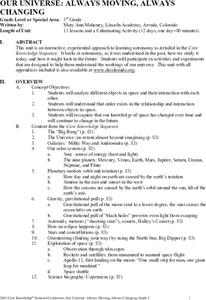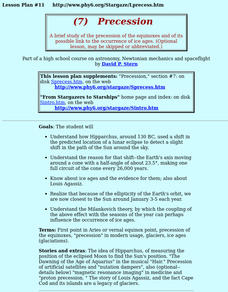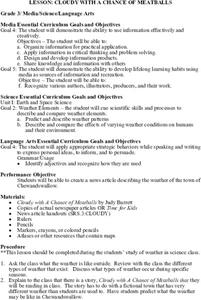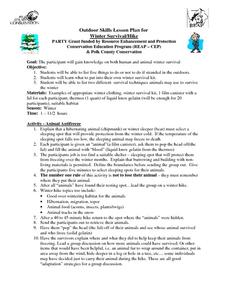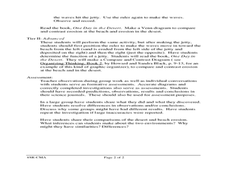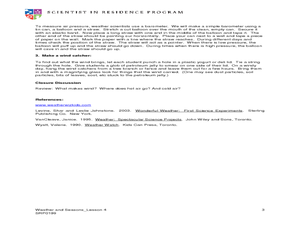Curated OER
Hickory Dickory Dock: The Biological Clock
Learners investigate the effect of day length on animal migrations. They view a Powerpoint presentation, identify their own personal migrations and cues, answer discussion questions, and test a hypothesis about seasons.
Curated OER
Our Universe: Always Moving, Always Changing
Students explore the main concepts of astronomy through the eleven lessons of this unit. The past, present, and future methods of studying the science are examined in this unit.
Curated OER
Biomes: Extreme Climate
Middle schoolers discuss the causes of global warming. For this earth science lesson, students examine how global warming is connected to the arctic and world climate. They write a paragraph about their interconnection.
Curated OER
Tracking Sunrise and Sunset
Pupils collect, record, and graph the sunrise and sunset times. They explain how the relationship between the tilt of Earth's axis and its yearly orbit around the sun produces the seasons.
Curated OER
Roaming Biomes
Students use the Internet to research the capabilities of earth-observation satellites. Using the information, they write a report on how remote-sensing technology is used to measure the impact of climate change. They identify the...
Curated OER
How Does Climate Affect Our Shelter Needs?
Fourth graders investigate how weather influences shelter choices. They explore the concept of insulation and discuss some traditional Native American shelters. They discuss the shelters used by the Okanogan people during the various...
Curated OER
Predicting the Greening of Spring With Red Emperor Tulips
Students examine seasonal changes by watching tulip plant growth across the continent utilizing the Journey North website. They develop hypotheses as to why the plants emerge and grow where they do.
Curated OER
Storms - What am I?
In this earth science worksheet, students use the clues to determine each of the stormy words in the puzzle. There are nine clues listed on the sheet.
Curated OER
A Thoreau Look at Our Environment
Sixth graders write journal entries o school site at least once during each season, including sketched and written observations of present environment. They can use sample topographical maps and student's own maps. Students can use...
Curated OER
How Does Temperature Vary Over Time?
Students examine the temperature flucuations on the Earth. After defining new vocabulary, they identify the flucuations of the Earth on a map. As a class, they develop a hypotheis on the temperature variation by examining the data.
Curated OER
Precession
Students explain how Hipparchus, around 130 BC, used a shift in the predicted location of a lunar eclipse to detect a slight shift in the path of the Sun around the sky. They examine the elliptical orbit in which the Earth travels around...
Curated OER
Glacier Climbing
Students discuss glaciers and the current distribution of glaciers around the Earth. They create simulated glaciers using cornstarch, shoeboxes, water, and pebbles.
Curated OER
Learning Lesson: The Shadow Knows II
Young scholars discover and practice how to calculate the circumference of the Earth. They measure the length of their shadows and use the distance they are away from the equator to complete the calculations. They discuss winter or...
Curated OER
Make Way for Wild Migrants
Students discuss the threats facing migratory species and track the seasonal journeys of wildlife in real space and in cyberspace. Once they have gathered information from several sources, they create a portfolio to share with others...
Curated OER
Cloudy With a Chance of Meatballs
Third graders discuss the weather and how it changes during the different seasons. They listen to a read aloud of Judy Barrett's, Cloudy With a Chance of Meatballs. They write and illustrate a news article about the weather that is found...
Curated OER
Fall Lesson Plans
Fall lesson plans can combine science, history, and writing into an enticing combination.
Curated OER
Designing a Study
Students explore features to consider when designing a scientific study. In this science research lesson, students examine different methods of data collection and consider which method would be appropriate for determining how many types...
Polk County Education
Winter Survival/Hike
Hibernation isn't just about staying fed, it's about staying warm. Young environmentalists explore the importance of staying warm in the wilderness with a short lesson about surviving in the wild. Using gelatin to represent warm-blooded...
Curated OER
Water and Ice: Part 1
Students observe the state changes in water. In this matter lesson, students observe, measure, and describe water as it changes state. Students explore how water can change from a solid to a liquid then back again. They journal their...
Curated OER
The Physical Environment
Fourth graders use damp sand, a baking pan, and water to simulate erosion. In this erosion lesson plan, 4th graders participate in a simulation to show what moving water does to land.
Curated OER
Wind and Air Pressure
Students make an anemometer, barometer, and wind catcher to see how wind and air pressure are related. In this wind lesson plan, students use these tools to measure the wind speed.
Curated OER
Sundials: Keeping Time Like Native Americans
Students explore the use of sundials. They observe the shadows cast by the sun and record the times at various points throughout the day. They create sundials and record the location of the shadows and the time of day. They view a...
Curated OER
Sculpt-a-Planet
Students study the moon and the planets. They create a painted, paper mache moon or planet sculpture.
Curated OER
Global Greenup
Students utilize satellite images to track the life cycle of vegetational growth over a large area. Animal migratory patterns are compared to this cycle.



